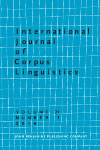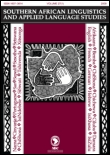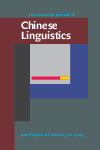
Rasprave
Scope & Guideline
Catalyzing insights in the field of linguistics and sociolinguistics.
Introduction
Aims and Scopes
- Linguistic Analysis and Theory:
The journal publishes research that delves into the theoretical aspects of linguistics, including syntax, semantics, phonology, and morphology, particularly in the context of the Croatian language. - Terminology and Lexicography:
A significant focus is placed on the study of terminology within specific fields (e.g., legal, medical, cybersecurity) and the development of lexicographic resources that enhance understanding and access to specialized language. - Language in Social Contexts:
Research exploring the role of language in social interactions, including the examination of stereotypes, discourse analysis, and the impact of language on identity and culture. - Educational Applications of Linguistics:
The journal addresses the application of linguistic research in educational settings, particularly in ESL and ESP, by evaluating methodologies and tools that support language learning. - Corpus Linguistics and Data Analysis:
There is a consistent focus on employing corpus-based methodologies to analyze language use, variation, and change, which helps in understanding contemporary linguistic phenomena.
Trending and Emerging
- Digital Linguistics and Technology:
There is a growing interest in the intersection of language and technology, with studies on web-based tools, digital annotation, and online resources for language learning and research. - Interdisciplinary Approaches to Language:
Research that integrates perspectives from various disciplines, such as environmental studies with linguistics in 'smart urban coastal sustainability,' signifies a trend towards interdisciplinary collaboration. - Crisis and Language:
The effects of global crises, such as the COVID-19 pandemic, on language use and terminology are emerging themes, reflecting the relevance of language in addressing contemporary social issues. - Data-Driven Linguistic Research:
An increase in studies employing data-driven methodologies, such as corpus linguistics, indicates a trend towards empirical research that relies on large datasets to analyze language patterns and usage. - Language and Identity:
Explorations of how language reflects and constructs identity, particularly in minority contexts, are gaining prominence, showcasing the journal's commitment to social relevance in linguistic research.
Declining or Waning
- Historical Linguistics:
Although historical perspectives are essential in understanding language evolution, the frequency of papers focusing on historical linguistics has decreased, possibly due to a shift towards contemporary language issues. - Sociolinguistic Studies:
Research addressing broader sociolinguistic themes, including language and gender or regional dialects, has become less prominent, indicating a potential narrowing of focus towards more specialized linguistic topics. - Philosophical Linguistics:
The exploration of philosophical aspects of language, such as language and thought or the nature of meaning, appears to be waning in favor of more empirical and data-driven linguistic studies.
Similar Journals

Journal of Portuguese Linguistics
Bridging Theory and Practice in Portuguese Language ResearchThe Journal of Portuguese Linguistics is an esteemed peer-reviewed academic journal published by UBIQUITY PRESS LTD, dedicated to the exploration of the rich complexities of the Portuguese language and its various linguistic dimensions. With an ISSN of 1645-4537 and an E-ISSN of 2397-5563, this open-access journal has been disseminating valuable research since 2002, ensuring that knowledge is accessible to all scholars, professionals, and students interested in Linguistics. Based in Portugal, it features a distinct focus on the linguistics pertinent to the Portuguese language, facilitating discussions that span theoretical and applied interests. The journal holds a respectable Q3 quartile rank in the field of Linguistics and Language, reflecting its growing significance and contribution to academia, as evidenced by Scopus rankings that place it in the 71st and 68th percentiles in Arts and Humanities as well as Social Sciences. Researchers and practitioners alike will find Journal of Portuguese Linguistics to be an indispensable resource for fostering discourse and innovation in the study of language.

RUSSIAN LINGUISTICS
Advancing the frontiers of Russian language studies.RUSSIAN LINGUISTICS is a peer-reviewed academic journal published by Springer, dedicated to advancing the understanding of the Russian language and its interplay with various linguistic frameworks. With a longstanding history that spans from its inception in 1974, the journal encompasses a broad range of topics within the fields of linguistics and language studies, offering valuable insights especially in *Developmental and Educational Psychology* and the intricacies of linguistics at large. Currently ranked in the Q2 quartile for Linguistics and Language, and holding substantial positions within Scopus rankings, RUSSIAN LINGUISTICS serves as an essential resource for researchers, educators, and students alike, fostering dialogue and collaboration within the international linguistic community. The journal notably provides critical access to research findings that enhance the comprehension of Russian linguistics' role in a global context, despite operating under a traditional access model. For those pursuing scholarly excellence, RUSSIAN LINGUISTICS remains a pivotal platform for disseminating innovative research and promoting the study of language.

International Journal of Corpus Linguistics
Unveiling Insights from Language DataThe International Journal of Corpus Linguistics, published by John Benjamins Publishing Co, is a premier academic journal dedicated to advancing the field of corpus linguistics. With an ISSN of 1384-6655 and an E-ISSN of 1569-9811, this journal serves as a pivotal platform for researchers and practitioners alike to explore the intricate relationships between language and corpora. Housed in the Netherlands and operating within the prestigious Q1 category in Linguistics and Language, the journal boasts impressive Scopus rankings, positioning it in the top percentiles of both Arts and Humanities and Social Sciences. Its commitment to rigorous peer-reviewed scholarship not only enhances understanding in the domain but also fosters collaboration among scholars. With coverage spanning from 1996 to 2024, the journal publishes cutting-edge research that contributes valuable insights into linguistic patterns and empirical studies. Whether you're an established researcher or a student embarking on your academic journey, the International Journal of Corpus Linguistics is an essential resource for anyone seeking to deepen their understanding of language through corpora.

Linguistica Pragensia
Exploring the Frontiers of Language StudiesLinguistica Pragensia, an esteemed journal published by Charles University Prague, Faculty of Arts, serves as a vital resource in the field of linguistics and language studies. Since its inception, this open-access journal has fostered scholarly communication and exchange, promoting research excellence in various linguistic disciplines. Its international standing is reflected in its Q3 ranking in the 2023 category of Linguistics and Language and its strategic position within Scopus, boasting ranks in both Arts and Humanities and Social Sciences streams. The journal is committed to publishing innovative research from established scholars and emerging voices, contributing to the dialogue surrounding significant linguistic issues and developments. With its base in the culturally rich Czech Republic and an open-access model since 2015, Linguistica Pragensia remains a leading venue for researchers, professionals, and students seeking to engage with contemporary linguistic scholarship.

Linguistics Vanguard
Illuminating the complexities of human communication.Linguistics Vanguard is a premier academic journal dedicated to advancing research in the field of linguistics and language studies, published by the esteemed Walter de Gruyter GmbH. With its impact factor placing it in the Q1 category for Linguistics and Language as of 2023, the journal demonstrates a significant influence in the academic community, boasting a Scopus rank of #194 out of 1088 in Arts and Humanities and a commendable percentile of 82. Since its inception in 2015, the journal has served as a critical platform for disseminating innovative research and fostering dialogue among scholars and practitioners, encapsulating a wide range of topics within linguistics. Despite being a subscription-based publication, it maintains an open approach to scholarship, encouraging robust academic exchange. Located in Berlin, Germany, at Genthiner Strasse 13, D-10785, Linguistics Vanguard is a must-read for those seeking to stay at the forefront of linguistic research and theory.

DEUTSCHE SPRACHE
Advancing Knowledge in German Language StudiesDEUTSCHE SPRACHE, published by Erich Schmidt Verlag, is a pivotal journal dedicated to the intricate study of the German language. With its ISSN 0340-9341 and E-ISSN 1866-5233, this publication serves as a vital resource for linguists, educators, and language enthusiasts alike. Spanning diverse topics within the fields of linguistics and language, psychology, and social sciences, the journal has earned a Q3 ranking in Linguistics and Language, alongside a Q4 ranking in both Psychology (miscellaneous) and Social Sciences (miscellaneous) as of 2023. Although the journal is not Open Access, it provides invaluable insights on the developments in German language research from its convergence years of 2002 to 2011 and 2017 to 2023. Positioned in Berlin-Tiergarten, Germany, DEUTSCHE SPRACHE continues to expand its influence and accessibility to researchers, professionals, and students keen on understanding the nuances of linguistic expression in the German language.

Fontes Linguae Vasconum
Bridging Contemporary Theories with Linguistic PracticeFontes Linguae Vasconum, published by GOV NAVARRA, DEPT CULT SPORT & YOUTH DIR GENERAL CULT-INST PRIN VIANA, stands as a pivotal academic resource in the field of Linguistics and Language studies. Established as an Open Access journal since 2007, it ensures wide dissemination of research findings and promotes collaborative dialogue among scholars, researchers, and students. With a growing impact factor reflected in its Q2 category ranking in Linguistics and Language for the year 2023 and an impressive standing in Scopus with a rank of #443 in Arts and Humanities, the journal serves as a significant platform for advancing knowledge derived from the rich linguistic heritage of the Basque language and beyond. The journal is dedicated to publishing high-quality research articles, reviews, and discussion pieces that explore diverse aspects of language, fostering connections between contemporary linguistic theories and their practical implications. Based in Pamplona, Navarra, Spain, Fontes Linguae Vasconum continues to evolve, providing researchers and academics with essential insights and a valuable reference in the vibrant field of linguistics.

Catalan Journal of Linguistics
Advancing Understanding in Language Studies.Catalan Journal of Linguistics is a distinguished academic publication dedicated to the dynamic field of linguistics and language studies. Published by the Universitat Autònoma de Barcelona, this open-access journal has been disseminating impactful research since 2002, making significant contributions to the understanding of linguistic theory, language acquisition, and sociolinguistics, particularly within the Catalan language context. With a robust engagement in the scholarly community, it proudly holds a Q2 ranking in Linguistics and Language as of 2023, reflecting its commitment to high standards of research and innovation. The journal is accessible to a global audience, promoting the free exchange of knowledge beyond geographical boundaries, and serves as an essential platform for researchers, professionals, and students aiming to stay at the forefront of linguistic inquiry. With its rich archive of articles, the Catalan Journal of Linguistics stands as a vital resource for anyone keen to explore contemporary linguistic issues and advancements.

Southern African Linguistics and Applied Language Studies
Advancing Linguistic Knowledge in Southern AfricaSouthern African Linguistics and Applied Language Studies is a prestigious journal dedicated to the exploration and analysis of linguistics and applied language studies within the Southern African context. Published by Taylor & Francis Ltd, this esteemed journal has established itself as a significant platform for scholars and practitioners since its inception in 2003. With an impressive Q2 ranking in the Linguistics and Language category and a current Scopus rank of #430 out of 1167, it occupies a vital position in the academic landscape, appealing to a diverse readership keen on linguistic research, language policy, and applied linguistics. While the journal is not currently open access, it provides comprehensive insights and scholarly articles that foster understanding and innovation in linguistic practices and language education. As of 2024, the journal continues to deepen its impact through rigorous peer-review and a commitment to advancing knowledge, making it a key resource for researchers, educators, and students seeking to navigate the complexities of language within the Southern African region and beyond.

International Journal of Chinese Linguistics
Transforming Understanding of Chinese Linguistic DynamicsInternational Journal of Chinese Linguistics is a distinguished publication that delves into various aspects of linguistic studies pertaining to the Chinese language. Published by John Benjamins Publishing Co, this journal stands out for its commitment to advancing the knowledge and understanding of Chinese linguistics within the global academic community. With an impact factor that places it in the Q2 quartile of linguistics and language, the journal is indexed in prominent databases, achieving ranks of #501 in Arts and Humanities and #580 in Social Sciences. These rankings reflect the journal's dedication to maintaining high scholarly standards and its relevance in both linguistic research and practical applications. While not categorized as Open Access, the journal provides necessary access through institutional subscriptions, thereby ensuring that valuable research reaches a broad audience. Covering a wide range of topics from syntax and phonetics to sociolinguistics and applied linguistics, the International Journal of Chinese Linguistics serves as an essential resource for researchers, professionals, and students seeking to deepen their understanding of the intricate relationship between language and culture in the Chinese context. With converging years from 2019 to 2024, it continues to evolve, reflecting ongoing developments in the field.